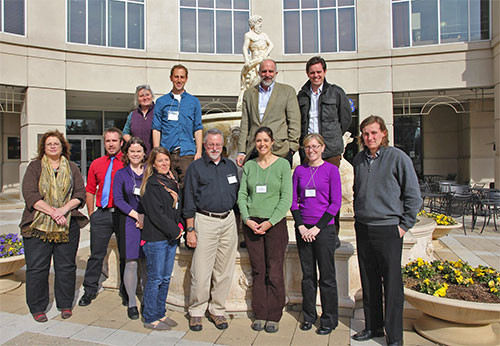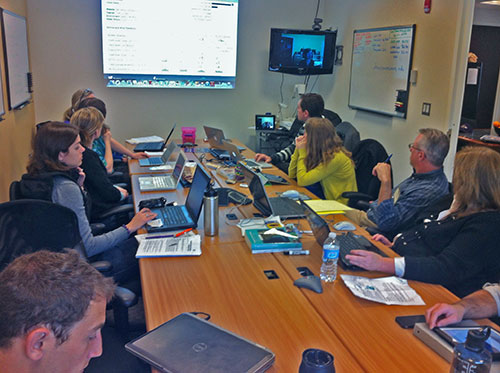Initiating a virtual environmental partnership between US and Australia teachers and students
Bill Dennison · | Environmental Literacy |We conducted our first workshop with 8 high school science teachers from around the U.S. to initiate a virtual environmental partnership. This initiative is called USAUS-H2O, and will be officially launched on World Water Day, 22 March 2013. The intent of the program is to educate and inform responsible stewardship of water resources between U.S. and Australian student teams through an interactive-virtual partnership. This program is funded by the U.S. Department of State as part of the Global Connections and Exchange Program. The Principal Investigator for the project is Dr. Judy O'Neil, Horn Point Laboratory, University of Maryland Center for Environmental Science. In addition, Drs. Cindy Heil from Bigelow Laboratory for Ocean Sciences in Maine, Simon Costanzo, Adrian Jones and Bill Dennison from the Integration and Application Network are actively contributing to the project. Prof. Andrew Campbell from Charles Darwin University is coordinating the Australian component of the effort.

The eight USAUS-H2O high school science teachers came from California, Florida, Maine, Maryland, North Carolina, Louisiana, and Texas to the UMCES Annapolis Office on 25-26 Feb. The most important accomplishment of the workshop was establishing an in person relationship between the entire U.S. team, as the rest of the project will be a virtual relationship. This was accomplished successfully with shared activities, meals, and discussions. In addition, each teacher brought along a local item of interest from their region which included Mardi Gras beads and school mascot from New Orleans, oranges from Florida, homemade tea from California, a piece of dogwood from North Carolina, lobster from Maine, crabs and "Old Bay" Seasoning from Maryland and a fossil from Texas. Science communication was discussed on the first day, which included an activity called USAUS-H2O Conceptionary. Program evaluation, World Water Day activities, and website review were covered on the second day. UMCES President Don Boesch stopped by and met the teachers as well. His daughter actually attended one of the schools in the program, South Terrebonne High School, Louisiana.
What was readily evident over the course of the workshop was how incredibly committed, passionate and competent these high school science teachers were. They had different levels of experience (novice to seasoned), came from different regions of the country (east, west and gulf coasts), and taught different types of students (all girls school to ethnically and economically diverse students). But the unifying theme was the teachers' readiness to engage their students with creative teaching approaches, going above and beyond the standard teaching requirements. Tyler Grinberg, Mare Island Technology Academy in California, engages his students in observing their local environment, including the native and exotic trees on their campus (pointing out that his campus harbored introduced Eucalyptus trees from Australia). Matthew Young, A&M Consolidated High School in Texas, has a classroom full of large aquaria that the students are in charge of maintaining and offers his students a scholarship from his own salary. Lauren Graham, Boothbay Region High School in Maine, has her students engaged in research experiences, and initiated the first Oceanography class, as their school is located on an island a stones through from the ocean. Gretchen Mann, Queen Anne's County High School in Maryland, capitalizes on her proximity to Chesapeake Bay to take her students on field trips and partners with nearby Washington College, and will be leading her students on a summer environmental science trip to Hondurus. Pat Cannizzaro, East Lake High School in Florida, uses his marine biology experience to make science classes more engaging. Caleb White, South Terrebonne High School, Louisiana, uses the surrounding environment of Southern Louisiana to teach his students. Kate Marchal, Louise S. McGehee School, New Orleans, has her girls plant beach grasses to help stabilize coastal dunes, and has run field trips down to LUMCON that even included a tour of the R/V Pelican, the research vessel Don Boesch designed when he was head of LUMCON. Claire McGlaughlin, Brunswick County Early College High School, North Carolina, connects her students to a school in Kosovo where she once taught, and teaches at an innovative “early College” high-school co-located on the campus of a Community College, complete with its own aquaculture ponds, which their students can use for water quality sampling.
Since this virtual environmental partnership will rely heavily on virtual tools to share data, photos and stories regarding the water cycle in different parts of the world, we conducted the website design section of the workshop using a virtual connection to the web developer. Adrian Jones participated virtually in the workshop and he and Simon Costanzo toured the draft website to get teacher input and feedback. When the workshop with Australian teachers takes place in a couple of weeks, a similar Skype session will be used.

workshop. Adrian Jones joined via Skype on the monitor.
An activity that was developed for the workshop was USAUS-H2O Conceptionary, using topics from the seven components of the water cycle. The teachers first played a few rounds of Conceptionary and then we collectively edited the Conceptionary topics and key words. With the help of the IAN team, we produced a Conceptionary kit for each teacher to take back to their schools for use with their students. We look forward to comparing some of the students' diagrams generated from this activity.

The success of this kick-off workshop bodes well for the project, and we look forward to the Australian teacher workshop and World Water Day.
About the author
Bill Dennison

Dr. Bill Dennison is a Professor of Marine Science and Vice President for Science Application at the University of Maryland Center for Environmental Science.